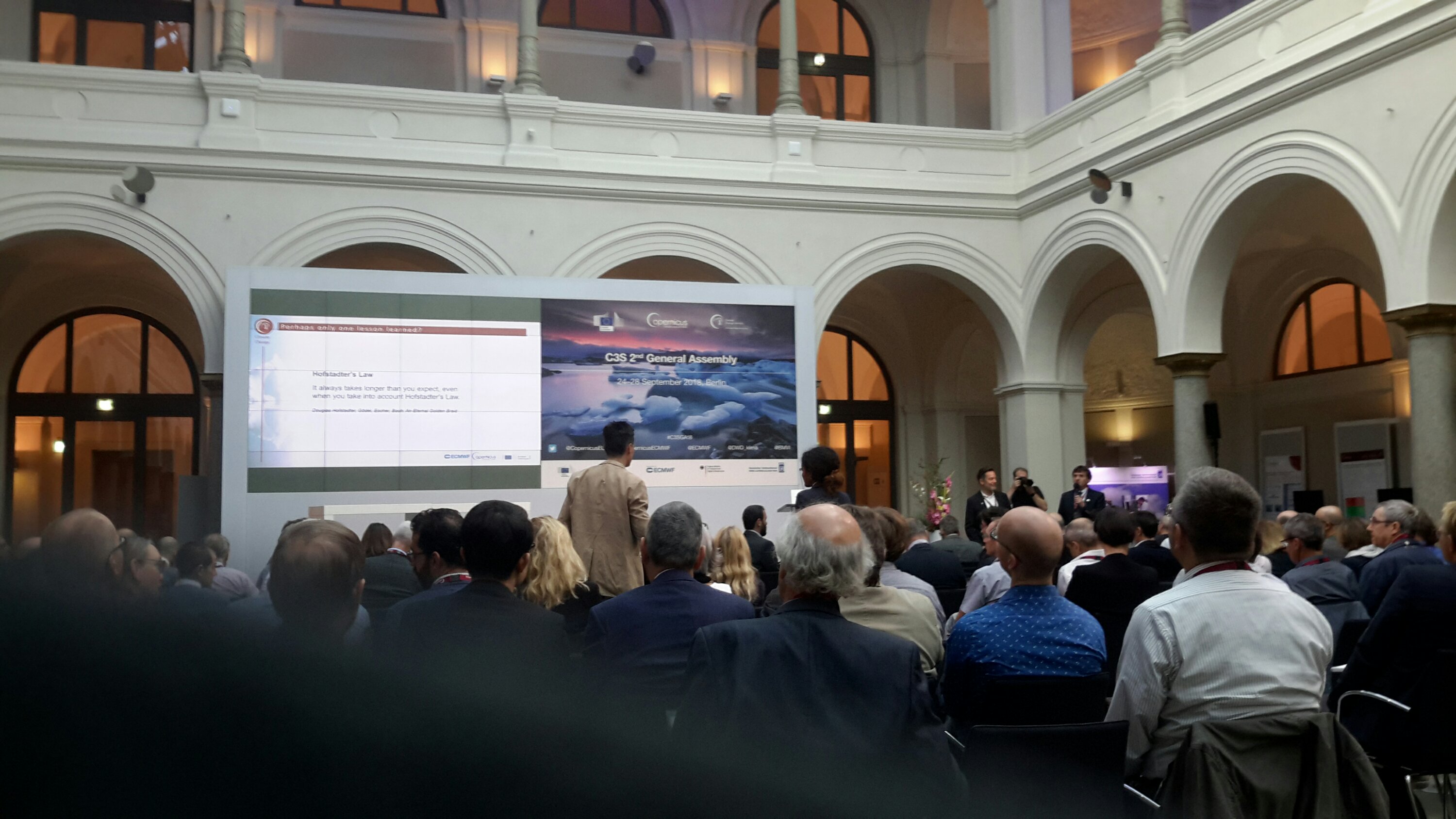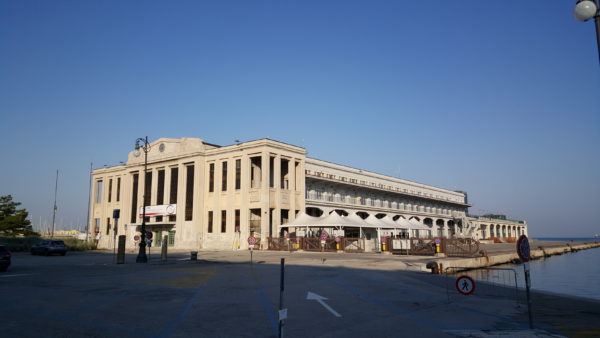Well, that year went quickly. This month, there is the COP28 hoopla, the ongoing El Niño and the speculation about the 2023 temperature ranking (which will not be that surprising). An open thread for climate topics…
Climate conference report
The 5th International Conference on Regional Climate
The fifth international conference on regional climate (ICRC 2023), organised by World Climate Research Programme’s (WCRP) coordinated downscaling experiment (CORDEX), has just completed. It was a hybrid on-site/online conference with hubs in both Trieste/Italy (hosted by the International Centre on Theoretical Physics, ICTP) and Pune/India.
The hybrid set-up, with video links between the two hubs and digital attendence through zoom, was a change from previous ICRCs held in ICTP (2011), Brussels (2013), Stockholm (2016), and Beijing (2019). It worked impressively well, and the CORDEX ICRC 2023 streaming is available from the WCRP CORDEX YouTube channel.
It seems as an eternity since the previous ICRC before the COVID pandemic, so I was curious to see how things have progressed since then. It was also interesting to compare my impressions from this conference with my blog posts here on RealClimate from the first ICRC in Trieste, the second in Brussels, the third ICRC in Stockholm, I see that questions concerning uncertainty and added value are still being debated.
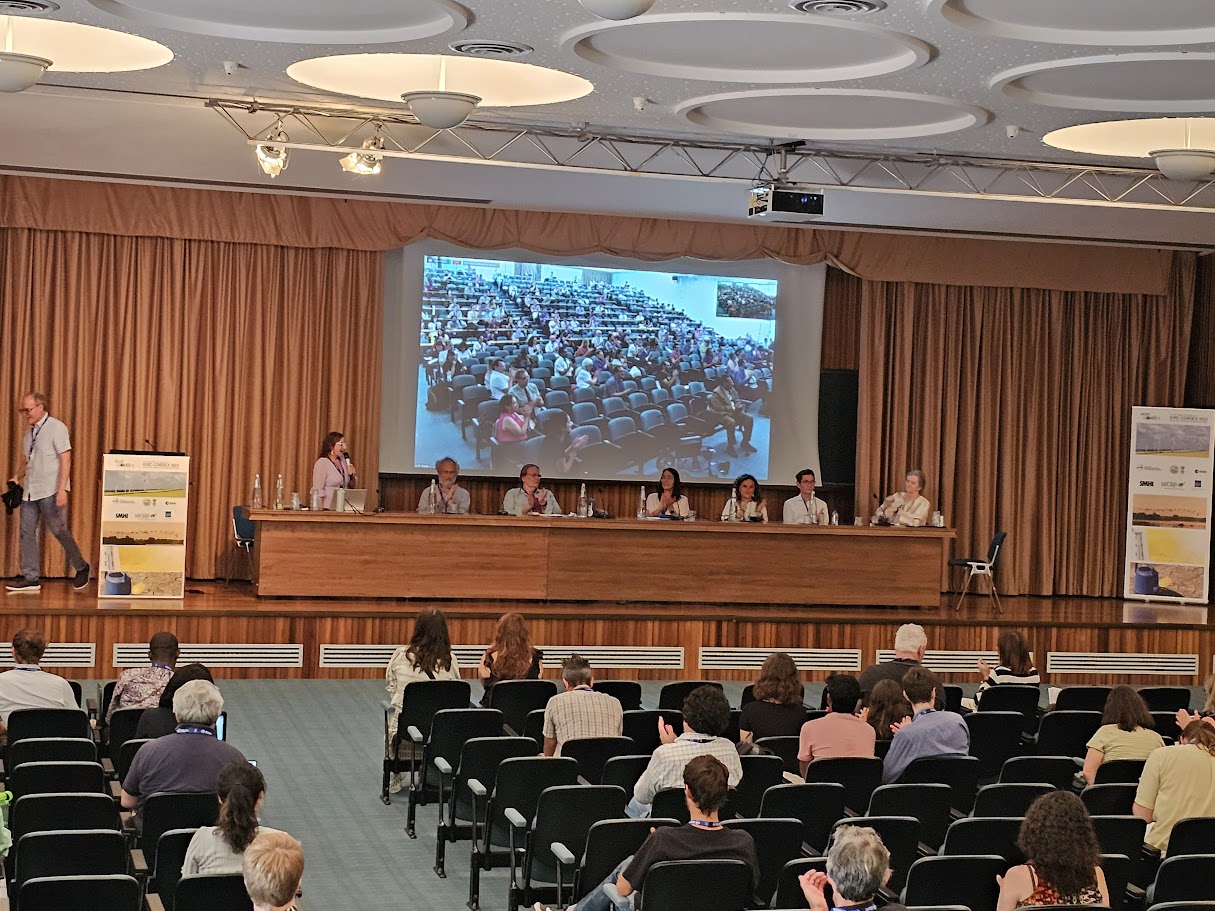
European climate services take an important leap forward
An important milestone was passed during the second general assembly of the Copernicus Climate Change Service, which took place in Berlin on Sept 24-28 (twitter hashtag '#C3SGA18'). The European climate service has become operational, hosted by the European Centre for Medium-Range Forecasts (ECMWF).
[Read more…] about European climate services take an important leap forward
A report from the European Meteorological Society’s annual meeting 2018
If you want to make a difference as a scientist, you need to make sure that people understand the importance of your work. Conferences give you one opportunity to explain what you’ve found out.
I sometimes wonder if the value of attending conferences is sufficiently appreciated. You can save time getting an overview over your field of research and catch up on the latest developments, which would take many weeks just from reading papers (and it gets harder these days to find the time reading papers).
Another benefit is being able to meet colleagues and discuss the latest findings and your results. In addition to sharing your thoughts, you represent your institution and enhance its visibility. Organisations pay a lot of money for increased visibility.
This week, I have listened to many good and interesting talks at the European Meteorological Society’s (EMS) annual meeting in Budapest (#emsannual2018), a meeting place for weather and climate experts across Europe and the rest of the world.
[Read more…] about A report from the European Meteorological Society’s annual meeting 2018
Fall AGU 2017
It’s that time of year again. #AGU17 is from Dec 11 to Dec 16 in New Orleans (the traditional venue in San Francisco is undergoing renovations).
As in previous years, there will be extensive live streams from “AGU On Demand” (free, but an online registration is required) of interesting sessions and the keynote lectures from prize-winners and awardees.
Some potential highlights will be Dan Rather, Baba Brinkman, and Joanna Morgan. The E-lightning sessions are already filled with posters covering many aspects of AGU science. Clara Deser, Bjorn Stevens, David Neelin, Linda Mearns and Thomas Stocker are giving some the key climate-related named lectures. The Tyndall Lecture by Jim Fleming might also be of interest.
As usual there are plenty of sessions devoted to public affairs and science communication, including one focused on the use of humour in #scicomm (on Friday at 4pm to encourage people to stay to the end I imagine), and a workshop on Tuesday (joint with the ACLU and CSLDF) on legal issues for scientist activists and advocates.
AGU is also a great place to apply for jobs, get free legal advice, mingle, and network.
A couple of us will be there – and we might find time to post on anything interesting we see. If any readers spot us, say hi!
Impressions from the European Meteorological Society’s annual meeting in Dublin
The 2017 annual assembly of the European Meteorological Society (EMS) had a new set-up with a plenary keynote each morning. I though some of these keynotes were very interesting. There was a talk by Florence Rabier from the European Centre for Medium-range Weather Forecasts (ECMWF), who presented the story of ensemble forecasting. Keith Seitter, the executive director of the American Meteorological Society (AMS), talked about the engagement with the society on the Wednesday.
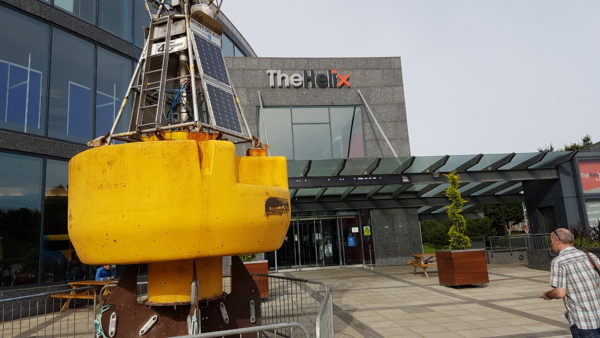
[Read more…] about Impressions from the European Meteorological Society’s annual meeting in Dublin
AGU 2016
It’s that time of year again. Fall AGU is the biggest gathering of geophysical scientists in the world (~24,000 attendees) and while it includes planetary science, seismology and magnetophysics, it is swamped by earth scientists, whose work covers the atmosphere, oceans, cryosphere, climate, natural hazards and paleoclimate.
As in previous years, many sessions and most of the keynotes will be available On-Demand (which is free but you do need to register) and there is a E-poster facility that lets non-attendees view some of the posters.
Some interesting sessions related to discussions at RealClimate will be the “Betting on Climate Change” (Mon, posters), “El Niño: Global Anomalies and Societal Impacts at Regional Scale” (Wed, Union Channel On-demand), and “The Up‐Goer Five Challenge: A Fun and Radical Way to Distill Your Science” (Fri). Of course, there are always the usual paleo-climate (e.g. Climate of the Common Era), model evaluation, and observational sessions to follow.
Keynotes from Isaac Held, Christine Hulbe, Nathalie Cabrol, Daniel Jacob and Bette Otto-Bleisner all sound promising, covering tropical cyclones, the last glacial maximum, the West Antarctic Ice Sheet, air quality and astrobiology (though probably not all at once).
If there are any other specific sessions or talks, you’d like to advertise or comment on, put them in the comments. Discussion on Twitter is using the #AGU16 hashtag. If anyone wants to write up some sessions or highlights, send them along and we’ll post them.
Q & A about the Gulf Stream System slowdown and the Atlantic ‘cold blob’
Last weekend, in Reykjavik the Arctic Circle Assembly was held, the large annual conference on all aspects of the Arctic. A topic of this year was: What’s going on in the North Atlantic? This referred to the conspicuous ‘cold blob’ in the subpolar Atlantic, on which there were lectures and a panel discussion (Reykjavik University had invited me to give one of the talks). Here I want to provide a brief overview of the issues discussed.
What is the ‘cold blob’?
This refers to exceptionally cold water in the subpolar Atlantic south of Greenland. In our paper last year we have shown it like this (see also our RealClimate post about it):
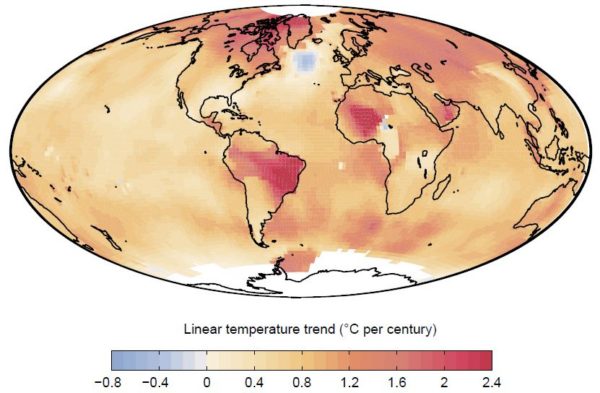
Fig. 1 Linear temperature trends from 1901 to 2013 according to NASA data. Source: Rahmstorf et al, Nature Climate Change 2015.
[Read more…] about Q & A about the Gulf Stream System slowdown and the Atlantic ‘cold blob’
What is new in European climate research?
What did I learn from the 2016 annual European Meteorological Society (EMS) conference that last week was hosted in Trieste (Italy)?
[Read more…] about What is new in European climate research?
